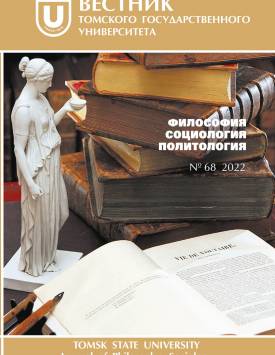Goal setting in science policy: between trust and suspicion
This article is a response to Ilya T. Kasavin’s “When the future borders on utopia: science in perspective”. The article deals with the problem of coordinating the two contours of science - internal (scientific research) and external (institutional infrastructure). The main thesis is that the mismatch is associated with a conflict on the outer contour between the long-term and local goals of the development of science. So, in the case of Russian science, the long-term goal is associated with reaching the “world level” of scientific results and the advancement of the scientific frontier. This goal requires a long time, which will allow scientists to gain the necessary experience to publish articles in high-ranking journals. In addition, the emergence of science to new frontiers implies the openness of the academic community to the global world. The author believes that the achievement of this goal requires the preservation of a fictitious institutional framework that retains the possibility for spontaneous self-organization of the community and open competition of ideas. At the same time, local goals (control over the effectiveness of scientific work over short time periods) encourage the status quo to be maintained in science. The negative effect of increasing formal control over scientists leads to the strengthening of mutual distrust between scientists and the authorities. On the one hand, “institutionalized suspicion” is cultivated, which consists in the presumption of bad faith of agents. On the other hand, the pressure of ineffective rules reduces the credibility of the institution and encourages avoidance of their implementation. Such an institutional policy creates a kind of “trap”, which leads to the establishment of a norm that does not meet anyone's interests. The author believes that the strengthening of bureaucratic pressure on science is associated with the influence of the ideas of post-positivism. The post-positivist desacralization of science had at least two external effects - denialism (distrust of expert knowledge) and oversimplification of the politics of science. The author shows that in order to compensate for these negative effects, we need a new “myth about science”. This “myth” aims at establishing trust as a key value of science policy, which is beneficial not only for science, but also for society as a whole. It would free up significant resources (human, intellectual, material), which are now being spent on ineffective control. The author declares no conflicts of interests.
Keywords
science policy, institution, science development, control, trust, scientific community, academic freedomAuthors
| Name | Organization | |
| Tukhvatulina Liana A. | Institute of Philosophy, Russian Academy of Sciences | spero-meliora@bk.ru |
References

Goal setting in science policy: between trust and suspicion | Tomsk State University Journal of Philosophy, Sociology and Political Science. 2022. № 68. DOI: 10.17223/1998863X/68/23
